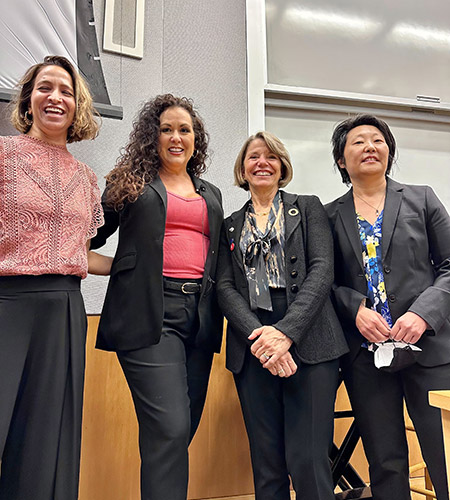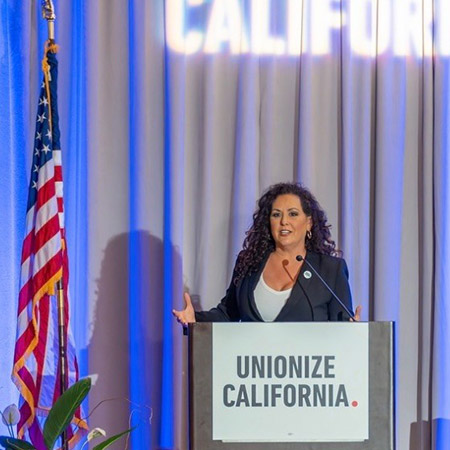By Andrew Cohen

As much as Lorena Gonzalez Fletcher likes seeing young people’s surging interest in the labor movement, she loathes the reason for it.
“It’s the product of things being really screwed up,” said Fletcher, the first woman and person of color to head the 2.1 million-member California Labor Federation, with its 1,200 affiliated unions. “We’ve done such a bad job providing workers with any kind of equity. There are more billionaires and higher poverty rates than ever before. We need collective action that demands change.”
Fletcher candidly unpacked her unlikely career path and quest to strengthen unions before a full crowd at a recent Center for Law and Work (CLAW) event. Called the “brain trust for California’s most ambitious policy ideas” by Politico while in the California State Assembly, she has pushed to make California a national leader for worker rights.
“When I was in the California Labor Agency, every time we saw a piece of legislation with her name on it we celebrated,” said CLAW’s founding Executive Director Christina Chung, who formerly directed labor policy at the state agency as a gubernatorial appointee. “There are monumental barriers to enacting good policies for workers, even in California, but she never backed down in making things happen.”
As a California legislator, she pushed the state to raise its minimum wage to $15 an hour, and crafted the nation’s strongest rules aimed at closing the gender pay gap. She also helped California become the first state to require paid sick days for private sector employees regardless of employer size, and to require paying farm workers overtime if they work over eight hours in a day.
“Unions are here to save democracy,” said Fletcher, who made history when she brought farm workers into the California Labor Federation after an almost 16-year absence. “The more we go in the direction of un-regulation, the more we’re getting to a dangerous spot in this country. The solution is giving workers a voice on the job. That’s why we’ve sponsored 13 bills waiting for the Governor’s signature by Oct. 14.”
Student reaction
Maria Watson, a former Chicago Teachers Union member who’s now a 2L, said her union did far more than negotiate its members’ benefits and that it helped provide students with vital resources for long-term success.
“My parents are both low-wage workers,” said Watson, who took Labor Law with Professor and CLAW Faculty Co-Director Catherine Fisk ’86 last spring and calls it one of her favorite classes. “It was incredibly refreshing and empowering to hear how Lorena has been able to effect change by combining her lawyering and community organizing skills without losing sight of her working-class roots. I’m so excited to find out more about CLAW and the work the center is doing.”
The center, which confronts urgent issues facing vulnerable working populations, is one of many options for Berkeley Law students interested in labor law. The Berkeley Journal of Employment and Labor Law is the field’s top-rated student journal, and pro bono projects including the Workers’ Rights Clinic, Berkeley Law & Organizing Collective, and La Alianza Workers’ and Tenants’ Rights Clinic offer practical experience.
Chung said California has the nation’s largest populations in the country of low-wage workers, with nearly one out of every three workers in the state earning far below a living wage. She noted how that deep economic inequity has played a role in reigniting the labor movement, which is increasingly led by younger workers, people of color, and women.
“I can’t overstate how much I appreciated the event and Lorena’s passion for labor justice,” 2L Belen de Leon said. “Beyond her wildly impressive resume, it was so refreshing and inspiring to see someone from a similar first-generation, immigrant background hold themselves so authentically as a lawyer and a leader. The way she let her experiences and inherent sense of ‘righteousness’ inform her advocacy and policy imagination is something that I aspire to emulate in my career.
“So often, when we’re focused on mastering the law, we take on a very myopic understanding of the world and what we can accomplish. But Lorena never let entrenched legal systems restrict her vision of what’s possible for worker justice.”
A rapid rise
Fletcher graduated from Stanford, got a master’s degree at Georgetown, and earned her law degree at UCLA. Her first summer job was with the San Diego Labor Council’s Labor Participation nonprofit, handing out food bags to striking workers.
Soon after Cruz Bustamante was elected California’s lieutenant governor, she worked for his office as an environmental attorney.

“I realized the most exciting part of that job wasn’t reading CEQA (California Environmental Quality Act) documents, it was interacting with low-wage workers affected by permitting decisions along the coast,” she said. “If you can’t put food on the table, you’re not worried about whether you’re using paper or plastic bags.”
Fletcher became political director, then secretary-treasurer and chief officer, of the San Diego-Imperial Counties Labor Council. Overseeing a large coalition of unions, she became disgruntled — and determined — when political candidates who sought union support during their campaigns went MIA after being elected.
“That’s why I ran for State Assembly,” she said. “It can be hard to change state policies that are preempted by the National Relations Labor Act. We’ve had plenty of losses, but we’re resilient and we’ll keep advocating for union rights because it’s the right thing to do and the victories we’ve gained have been very important.”
In 2014, one year after being elected, Fletcher crafted the law enabling 6.5 million Californians to earn paid sick leave. She also authored a bill to protect janitorial workers against sexual assault and provide professional cheerleaders basic labor protections, both of which became subjects of national PBS documentaries.
Corporate accountability Gig economy protections
With a fast-growing gig economy workforce, Fletcher strives to prevent companies from unfairly classifying workers as independent contractors rather than employees. She authored the 2019 law codifying the ABC test, the strongest legal protection against worker misclassification and wage theft, and a 2021 bill ensuring employers in California can be criminally prosecuted and imprisoned for intentionally stealing wages.
“The goal isn’t to make attorneys rich from class action lawsuits, it’s to make companies actually abide by the law,” Fletcher said. “You do that by broadening options for attorneys general to use injunctions and other methods to effectively enforce labor laws.”
“We’re pushing constantly for workers on the edges,” she said. “There’s garment work done completely by immigrants, including many who were trafficked. Big corporations love to subcontract out work to avoid accountability and unionization, but we changed the law so stores are actually held liable for subcontractors if they don’t pay minimum wage for the clothing these workers sew.”
The list of the workers whose rights Fletcher has fought for and advanced throughout her career is long: gig workers, delivery drivers, grocery store workers, hotel workers, warehouse workers, janitors, home health care workers, nail salon workers, and garment workers, to name a few. Currently, she said, one of the bills on Gov. Gavin Newsom’s desk would make working conditions of domestic workers safer.
Lamenting how corporate profits and CEO salaries soared during the COVID-19 pandemic, Fletcher said such an arc is not sustainable.
“We celebrate tech innovation and entrepreneurship but without much thought about what’s happening to workers along the way,” she explained. “That’s why union contracts in the workplace are so important. It’s the strongest protection workers can have and enables them to say, ‘See, I have this right spelled out here in my contract.’”